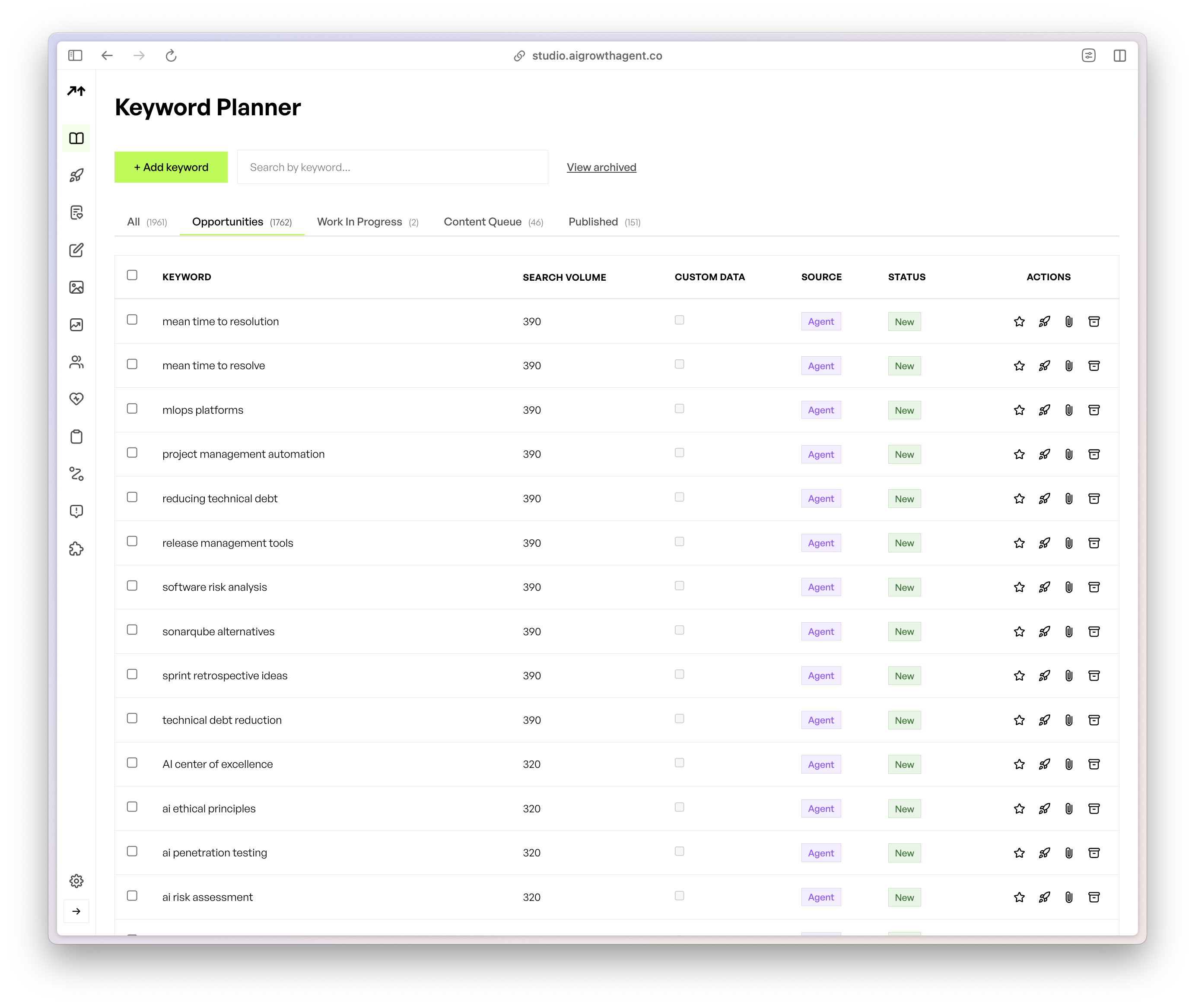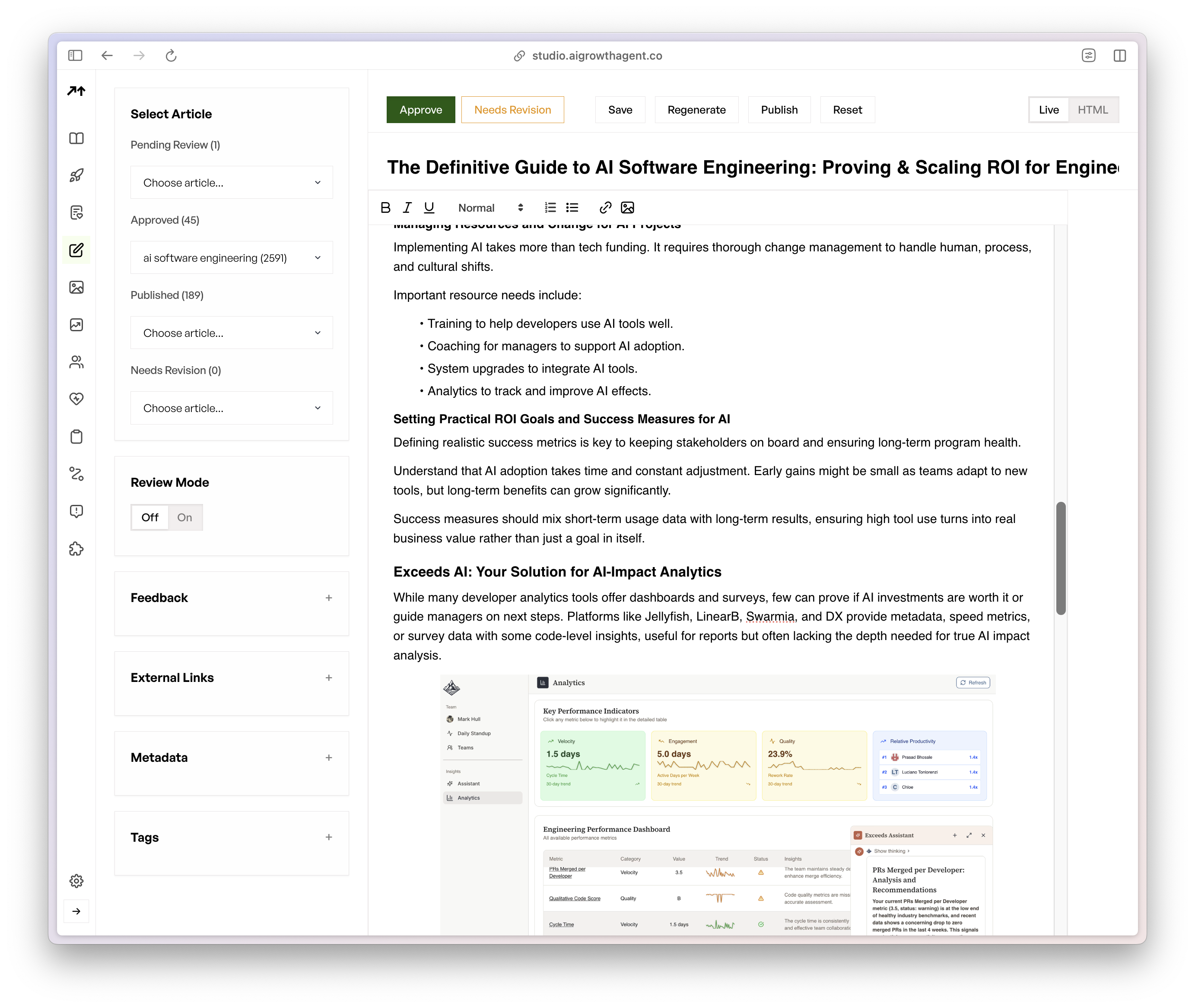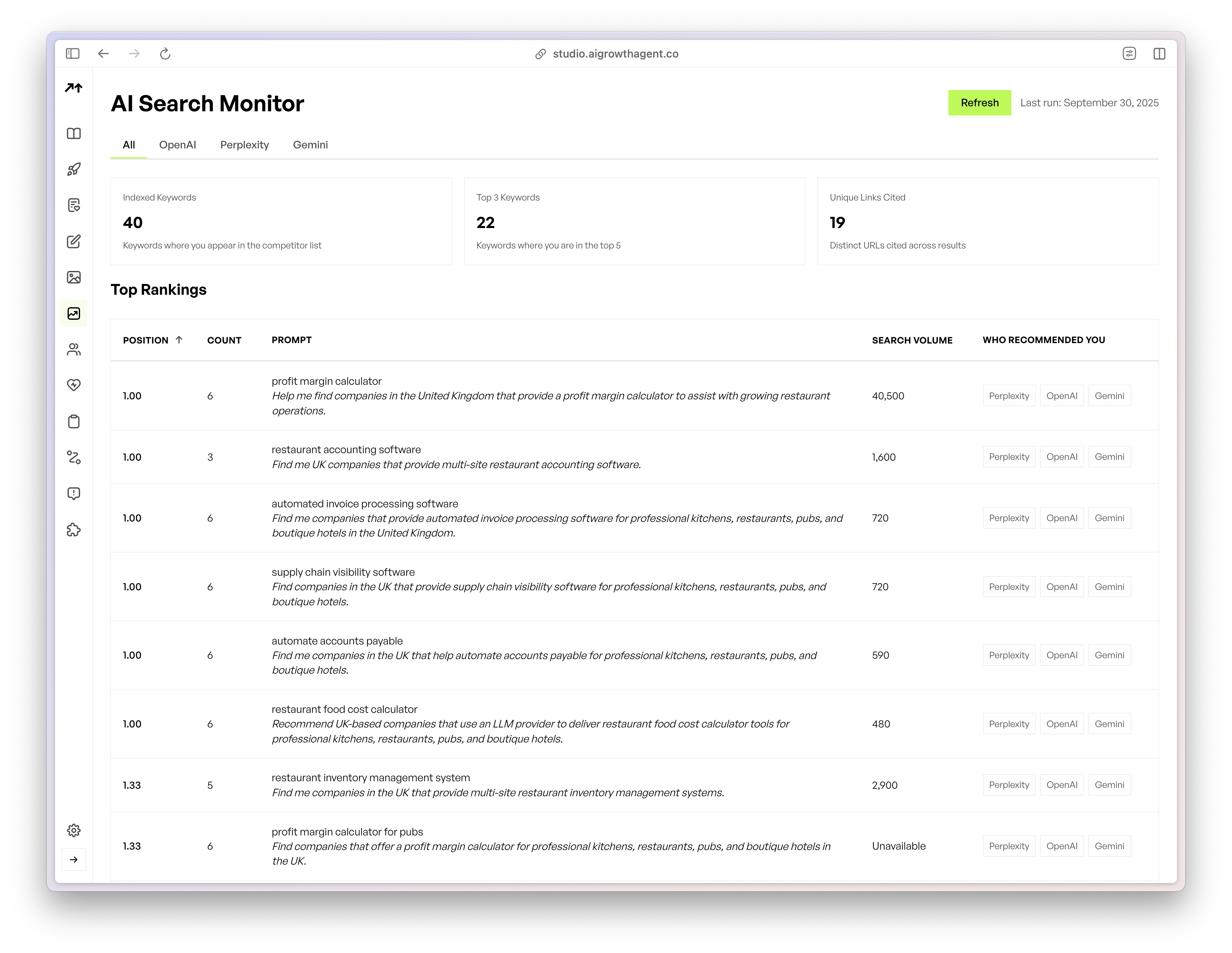Key Takeaways
- The Google June 2025 Core Update raised the bar for helpful content, site-level trust, and clear demonstration of experience, especially on smaller, independent sites.
- Organic rankings and AI Overviews now reinforce each other, so gains or losses in traditional search strongly influence visibility in AI-powered answer panes.
- Technical SEO, structured data, and vector-friendly content formats have become prerequisites for consistent indexing and citation by AI search systems.
- Manual SEO and ad hoc AI writing cannot match the scale, speed, and consistency now required, which makes programmatic SEO a practical necessity in 2026.
- AI Growth Agent provides a programmatic SEO system that engineers, publishes, and optimizes content for AI search and LLM citation; Book a demo with AI Growth Agent to see it in action.
The June 2025 Core Update and Its Impact on AI Search
The June 2025 Core Update was introduced as a broad core update to better surface relevant, satisfying content from all types of sites. The rollout ran from June 30 to July 17, 2025 and followed the March 2025 core update.
The update produced unusually high volatility in markets such as the United States and the United Kingdom, with major shifts to ranking mechanisms rather than minor adjustments. Google effectively re-scored large portions of its index against updated quality systems.
Analysis of 1,000 notable winners and losers showed a clear recalibration of content quality, relevance, and site-level trust. Many smaller sites that publish original, practical content gained visibility, which signaled less reliance on pure domain authority and more weight on user satisfaction.
The update also tightened the connection between organic search and AI Overviews. Sites that gained rankings often saw more frequent inclusion or citation in AI answer panels, while sites that lost rankings saw the opposite.
Teams planning 2026 search strategies now need to treat AI Overviews and LLM citations as core outcomes of SEO, not as side effects.
Core Shifts That Redefined Authority for AI Search
Google’s Stronger Preference for Holistically Helpful Content
Pages that improved after the update tended to provide very complete answers, go beyond surface-level content, and show clear first-hand experience. These pages aligned closely with Google’s E-E-A-T principles.
Google’s systems now evaluate how well a page satisfies intent across depth, structure, and supporting elements like visuals and examples. Shallow or generic content that only repeats obvious information is less likely to perform well in this environment.

Organic Rankings and AI Overviews Now Move Together
Evidence from June 2025 and later updates shows strong overlap between sites that gain organic traffic and those surfaced more often in AI Overviews. Visibility in one channel now supports the other.
For many queries, AI systems appear to use the same or closely related authority signals as organic search. Brands that earn consistent top rankings are more likely to be cited by tools such as ChatGPT, Perplexity, and Google AI Overviews.
Technical Quality as a Requirement for AI Indexing
Some analysis connected performance gains to advances in Google’s vector and semantic retrieval systems, such as an internal MUVERA breakthrough. These systems reward content that is easy for machine learning models to parse.
Technical SEO now plays a direct role in AI visibility. Key elements include:
- Clean metadata and structured headings for clear hierarchy
- Schema markup that defines entities, relationships, and actions
- Machine-readable formats such as LLM.txt to guide AI crawlers
- Fast, stable infrastructure that supports frequent crawling
Request a demo of AI Growth Agent to see how this looks in a programmatic setup.
Why Traditional SEO Struggles After the June 2025 Update
Manual Content Efforts Lose Ground to AI Scale
The volume of AI-generated content grew rapidly after 2025, while Google raised expectations for depth and originality. A typical team publishing a handful of articles per month now competes with thousands of pages on similar topics.
Each month that production remains manual, a brand’s relative visibility shrinks. The gap widens further as core updates compound long-term performance trends.
Velocity and Consistency Become Ongoing Requirements
Core updates roll out multiple times per year and re-score sites based on long-term behavior. Search performance in 2026 reflects not only recent content but also months of publishing patterns, quality, and technical stability.
Maintaining that cadence with manual workflows is difficult. Teams often trade off either speed, quality, or technical completeness, which reduces their chances of earning AI citations at scale.
Limitations of Common SEO and AI Content Approaches
|
Feature |
Traditional SEO Agencies |
Basic AI Content Tools |
AI Growth Agent |
|
Content engineering scale |
Low, manual production |
Low, unstructured drafts |
High, programmatic pSEO engine |
|
Technical SEO optimization |
Basic, manual checks |
Minimal or none |
Advanced, including schema and LLM.txt |
|
AI citation focus |
Indirect, page-level |
None |
Direct, designed for LLM citation |
|
Time to first article |
Weeks or months |
Immediate but raw |
About one week with engineering baked in |
Many SEO agencies still rely on a craftsman model, which is careful but slow and difficult to scale. Basic AI tools speed up drafting but rarely handle research, structure, and technical optimization to a level that 2026 AI search demands.
Discuss whether programmatic SEO is a fit for your roadmap.
How AI Growth Agent Supports Post-Update SEO in 2026
AI Growth Agent operates as a programmatic SEO agent that designs, writes, and technically optimizes content architectures to help brands become clear authorities in defined topics.
Programmatic Workflow Built for AI Search
The system handles research, writing, and technical implementation as one workflow. It clusters keywords, defines content hierarchies, drafts and refines articles, and applies schema and metadata for AI readability.

Teams typically start with a one-hour kickoff to define the brand narrative and constraints. The agent then runs programmatic keyword research, sets up the technical environment, and begins publishing content on a predictable schedule.
Key Capabilities Relevant to the June 2025 Shift
- Multi-site programmatic deployment for organizations that manage several brands or portfolios.
- Fast content generation against emerging topics, allowing coverage of news and trends while interest is still building.
- Database-to-content automation that converts proprietary data into indexable, search-focused articles.
- Automated asset placement and metadata optimization to support image SEO and richer search snippets.

Examples of Brands Adapting with AI Growth Agent
Several brands have used AI Growth Agent to improve authority and AI visibility after the June 2025 update.
Exceeds AI
Within weeks of launch, Exceeds AI became a recommended alternative in Perplexity and began appearing in Google AI Overview and Gemini snapshots for core performance-review keywords.
BeConfident
BeConfident, which competes with Duolingo and Busuu, indexed quickly after programmatic publishing and was recommended in Google AI Overview and Gemini as a leading English learning app in Brazil.
Bucked Up
Within the first month, Bucked Up appeared in ChatGPT responses as a top protein soda brand and earned prominent citation for “best protein soda” queries.
Gitar
Over roughly two months, Gitar became a frequent reference for AI-powered CI/CD automation across Google AI Overview, Gemini, ChatGPT, and Perplexity on topics such as fixing broken CI builds and self-healing software.
Why Programmatic SEO Matters After the June 2025 Update
The June 2025 Core Update signaled that Google now expects higher content quality, stronger signals of experience, and more robust technical implementation. These expectations continue to shape search and AI behavior in 2026.
Programmatic SEO helps teams meet those expectations by combining:
- Consistent publishing velocity over long periods
- Structured content architectures built around user intent
- Embedded technical best practices for AI indexing and citation
AI Growth Agent gives marketing leaders a way to move from one-off content campaigns to a durable, system-driven approach.
Schedule a demo of AI Growth Agent to explore whether this model aligns with your 2026 growth plans.
Frequently Asked Questions (FAQ)
How did the June 2025 Core Update change what it takes to earn AI citations?
The update strengthened the link between organic rankings and AI answer inclusion. Pages now need clear evidence of experience, comprehensive coverage of the topic, and solid technical structure. When those elements are present, LLMs have more confidence in citing the content.
Google says there is nothing new to do after core updates. Why does programmatic SEO still matter?
Google continues to recommend helpful, people-first content, but the scale and precision required to compete have increased. A programmatic system helps teams apply that guidance across hundreds or thousands of pages instead of a small set of manual articles.
Can sites affected by earlier helpful content updates still recover?
Many sites that improved content quality, clarified expertise, and fixed technical issues saw recovery in later core updates. A programmatic approach supports this by making improvements consistent across the full site, not only on a few key pages.
How is AI Growth Agent different from generic AI writing tools?
Generic tools focus on text generation. AI Growth Agent focuses on the full content lifecycle, including research, clustering, drafting, review, schema, and machine-readable guidance such as LLM.txt. That end-to-end process is better aligned with how AI search evaluates and cites content.
Which technical elements matter most for AI indexing in 2026?
Structured data, clear metadata, clean headings, and stable site performance are now baseline requirements. Additional elements such as LLM.txt, well-annotated images, and consistent internal linking help AI systems interpret and trust the content at scale.